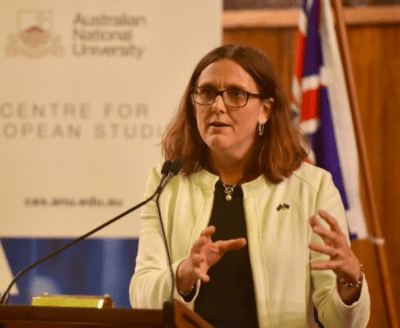FREE-TRADE Agreement (FTA) negotiations between the European Union (EU) and Australia began in Canberra on Monday when Australian Government ministers met with delegates of the EU including EU Commissioner for Trade, Cecilia Malmström.
.

EU Trade Commissioner Cecilia Malmström at Australian National University on Monday night after meetings with the Australian Government which launched the EU-Australia Free Trade Agreements talks. Image: EU delegation in Australia.
“The list of countries standing up for fair, open and rules-based global trade is growing,” Ms Malmström said in a speech at the Australian National University on Monday night after the opening trade talks.
She said with a free trade agreement in place Australia and the EU, Australia’s largest investor, could increase trade in goods and services while lowering prices for consumers, and increase investment.
“EU-Australia bilateral trade amounts to €46 billion per year.
“The EU and Australia are sending a signal that we are open outward-looking traders, that we believe in a rules-based multilateral system and well-regulated markets.
“Trade and society at large are changing, and we want our agreements to reflect that.
“Every negotiation concluded sends a message to the world; that the EU and its partners are coming together to shape globalisation, to stand up for free trade, and to agree on a rule book that works for everyone.
EU develops agreements with a circle of friends
Ms Malmström said the EU has agreements with Singapore and Vietnam, had recently concluded an agreement with Japan, it has a progressive agreement now in force with Canada and had concluded work with Mexico and other countries in Latin America.
“We are in the process of negotiating agreements with other ASEAN member states.”
Federal Minister for Agriculture and Water Resources David Littleproud said he and Commissioner Malmström discussed ways in which an FTA would create opportunities for agriculture in Australia and the EU.
“The EU is already our fourth-largest agricultural export destination and we are confident this future FTA will increase the value of the EU market for our farmers,” Mr Littleproud said.
Reduced tariffs on EU imports of Australian product, as well as improved access, are among the key areas to be raised by Australia in the talks as a means of giving its producers a competitive edge over countries which do not have FTAs with the EU.
Agriculture industries already strong: canola on top
In 2016-17, Australia’s top exports to the EU were canola at $1.9 billion, wine at $566 million, wool at $333 million, beef and veal at $229 million, and nuts at $226 million.
GrainGrowers’ trade and economics manager, Luke Mathews, said the EU is Australia’s largest canola export market and that an FTA would underpin the trading relationship.
“In 2016/17, Europe accounted for nearly 90 per cent of total Australian canola exports,” Mr Mathews said.
“Maintaining and building trade with Europe is of critical importance to Australian farmers.”
“We urge the Australian Government to negotiate a comprehensive and high-quality trade agreement with the EU that improves market access and facilitates efficient trade.
Mr Mathews said the Australian grains industry was in a fortunate position, with the majority of its grains and pulses entering EU markets duty-free, or with a limited duty.
“However, for some of our cereal, pulse or processed grain and oilseed exports we continue to face modest tariff and Tariff-Rate Quota (TRQ) barriers.
“We look forward to seeing these remaining barriers eliminated under the EU FTA.
“In addition, the FTA needs to reinforce support for an effective rules-based trading system.
“It is crucial that all non-tariff measures that are put in place to protect eco-systems and plant and animal health are based on sound science and existing international standards.”
Mr Mathews said opening new export market opportunities for Australian grains and reducing distortions in global markets were key priorities for GrainGrowers.
“We urge the Australian Government to ensure that agriculture is at the heart of the negotiations.”
The Federal Department of Agriculture and Water Resources (DAWR) said Australian farmers were already benefitting from other FTAs with countries including China, Japan and Korea, and they could look forward to better market access under the Trans-Pacific Partnership agreement (TPP-11).
Since January 2016, DAWR said it has secured more than 162 technical market-access gains across many markets and commodities.
Sources: DAWR, GrainGrowers, EU delegation

HAVE YOUR SAY